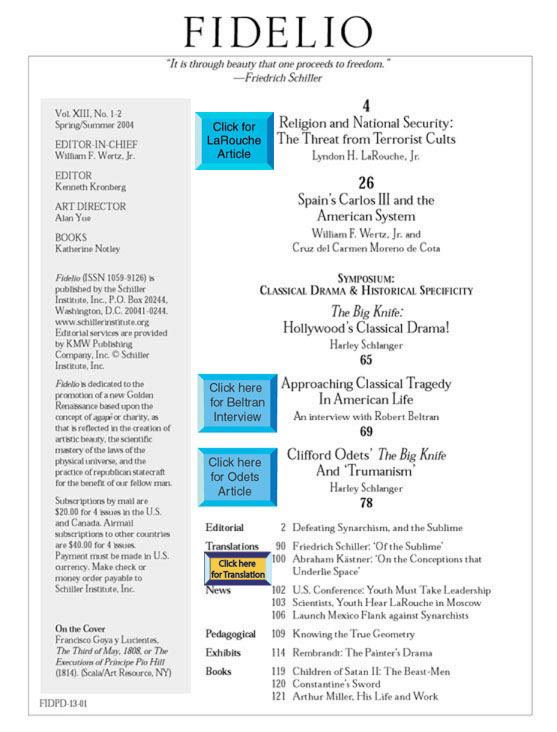
Home | Search | About | Fidelio | Economy | Strategy | Justice | Conferences | Join
Highlights | Calendar | Music | Books | Concerts | Links | Education | Health
What's New | LaRouche | Spanish Pages | Poetry | Maps
Dialogue of Cultures
FIDELIO
Journal of Poetry, Science, and Statecraft
Spring-Summer 2004 Vol XIII, No.1-2
Double Issue
PDF Archive
full issue, plus PDFs of each article
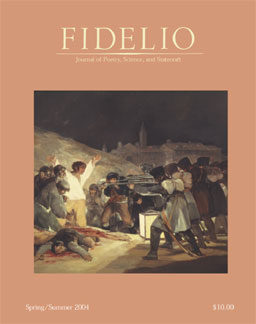
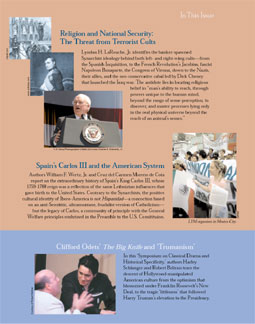
FRONT COVER
BACK COVER
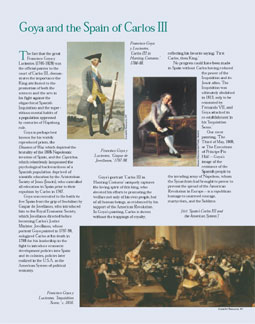
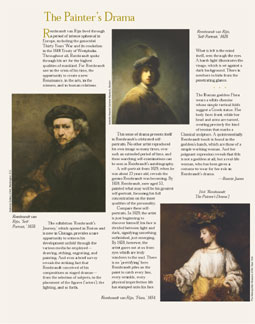
Front Inside Cover
Goya and the
Spain of Carlos III
Back Inside Cover
The Painter’s Drama
by William F. Wertz, Jr.
As the editorial, “Defeating Synarchism, and the Sublime,” in the just-released issue of Fidelio indicates, this Spring/Summer issue is dedicated to the fighting spirit of the late Mark Sonnenblick and to the memories of Carlos Cota and H. Graham Lowry, all of whom were persecuted because of their principled opposition to the Synarchist Quijanohacks, and all of whom demonstrated a sublime state of mind in the face of debilitating diseases.
The issue contains three features: 1) “Religion and National Security: The Threat from Terrorist Cults,” by Lyndon H. LaRouche, Jr.; 2) “Spain's Carlos III and the American System,” by William F. Wertz, Jr. and Cruz del Carmen Moreno de Cota; and 3) “A Symposium on Classical Drama and Historical Specificity,” which includes: “The Big Knife: Hollywood's Classical Drama!” by Harley Schlanger; “Approaching Classical Tragedy in American Life,” an interview with actor Robert Beltran; and “Clifford Odets' The Big Knife and 'Trumanism,' ” by Harley Schlanger.
The feature on Spain's Carlos III reports on the extraordinary history of this king, whose 1759-88 reign was a reflection of the same Leibnizian influences that gave birth to the United States. Carlos III implemented Leibnizian economic and educational reforms, including the creation of a National Bank, banished the Grand Inquisitor from Madrid, expelled the Jesuits from Spain and its possessions, supported the American Revolution, and laid the basis for the later independence of the nations of Ibero-America. Contrary to the Synarchists, the positive cultural identity of Ibero-America is not “Hispanidad”—a concoction based on an anti-Semitic, ultramontane, feudalist version of Catholicism— but rather the legacy of Carlos III, a community of principled commitment to the General Welfare as enshrined in the Preamble to the U.S. Constitution.
The cover of the new issue of Fidelio is Francisco Goya's “The Third of May, 1808, or The Executions of Principe Pio Hill.” The issue also includes other paintings and etchings by Goya, who was the official painter to the court of Carlos III.
There are two translations in the magazine—Friedrich Schiller's 1793 essay, “Of the Sublime,” and excerpts from Abraham Gotthelf Kaestner's 1790 essay, “On the Conceptions that Underlie Space.”
The issue contains five pages of Schiller Institute news; a Pedagogical Exercise—“Knowing the True Geometry, a Dialogue in Two Parts” by Bruce Director; a review of a Rembrandt exhibit by Bonnie James; and three book reviews: “Children of Satan II,” “Constantine's Sword: The Church and the Jews, A History,” and “Arthur Miller: His Life and Work.”
![]()
Fidelio Magazine:
schiller@schillerinstitute.org
ORDER FIDELIO Magazine Today
Join the Schiller Institute and receive 4 issues of Fidelio Magazine
FIDELIO Table of Contents PAGE
(text listing of all issues)
schiller@schillerinstitute.org
The Schiller Institute
PO BOX 20244
Washington, DC 20041-0244
703-297-8368
Thank you for supporting the Schiller Institute. Your membership and contributions enable us to publish FIDELIO Magazine, and to sponsor concerts, conferences, and other activities which represent critical interventions into the policy making and cultural life of the nation and the world.
Contributions and memberships are not tax-deductible.
VISIT THESE OTHER PAGES:
Home | Search | About | Fidelio | Economy | Strategy | Justice | Conferences | Join
Highlights | Calendar | Music | Books | Concerts | Links | Education | Health
What's New | LaRouche | Spanish Pages | Poetry | Maps
Dialogue of Cultures
© Copyright Schiller Institute, Inc. 2004. All Rights Reserved.
